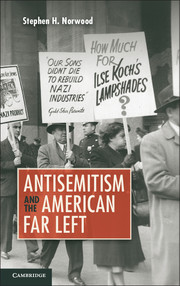Book contents
- Frontmatter
- Dedication
- Contents
- Photos
- 1 Promoting a Socialism of Fools
- 2 American Communists’ Tangled Responses to Antisemitism and Nazism, 1920–1939
- 3 World War II
- 4 Abandoning Assimilation
- 5 “Two, Four, Six, Eight, We Demand a Jewish State”
- 6 “Fiends in Human Form”
- 7 The Jewish Question Discarded
- 8 Shaping the Next Generations
- Notes
- Bibliography
- Index
7 - The Jewish Question Discarded
Far Left Hostility to Jews and Israel, 1956–1973
Published online by Cambridge University Press: 05 June 2014
- Frontmatter
- Dedication
- Contents
- Photos
- 1 Promoting a Socialism of Fools
- 2 American Communists’ Tangled Responses to Antisemitism and Nazism, 1920–1939
- 3 World War II
- 4 Abandoning Assimilation
- 5 “Two, Four, Six, Eight, We Demand a Jewish State”
- 6 “Fiends in Human Form”
- 7 The Jewish Question Discarded
- 8 Shaping the Next Generations
- Notes
- Bibliography
- Index
Summary
When Khrushchev’s February 1956 secret speech at the Twentieth Party Congress of the Communist Party of the Soviet Union (CPSU) denouncing Stalin’s crimes became available in the United States in June, there were rumblings of dissatisfaction within the American CP over Soviet unwillingness to acknowledge the severe damage that had been inflicted on Jewish cultural institutions in the USSR. Khrushchev’s secret speech made no mention of persecution of Jews under Stalin, the destruction of Yiddish culture, or the murder of Soviet Jewish writers and poets. Soviet hostility to Israel also distressed many CP members.
In 1956, Khrushchev’s revelations about Stalin, concern about Soviet antisemitism, the Kremlin’s strong backing of Egypt in the Suez War, and the Soviet invasion of Hungary precipitated the greatest crisis in the CP’s history, resulting in the departure of an even larger proportion of the membership than after the Molotov–von Ribbentrop Pact. This massive departure permanently relegated the CP to the margins of the far left. A younger generation uninterested in antisemitism assumed control of the far left when a radical movement again emerged in the United States during the next decade.
- Type
- Chapter
- Information
- Antisemitism and the American Far Left , pp. 171 - 207Publisher: Cambridge University PressPrint publication year: 2013



